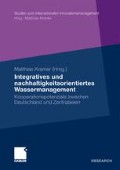Zusammenfassung
Nach Schätzungen von WHO und UNICEF haben über eine Mrd. Menschen keinen Zugang zu einer befriedigenden Wasserversorgung. Diese Zahl allein dokumentiert eindrucksvoll den bereits heute bestehenden Wassermangel. Dabei bezieht sich diese Angabe nur auf einen kleinen Teil des gesamten Wasserbedarfs. Wesentlich größere Anteile entfallen auf die landwirtschaftliche Bewässerung als Grundlage der Nahrungsmittelproduktion und den industriellen Bedarf als Grundlage der wirtschaftlichen Entwicklung.
Access this chapter
Tax calculation will be finalised at checkout
Purchases are for personal use only
Preview
Unable to display preview. Download preview PDF.
10.7 Literatur
Asano, T. (2003): Water Reuse. In: Metcalf and Eddy Inc.: Waste Water Engineering, Treatment and Reuse, 5th ed., Mc Graw Hill, New York
California Code of Regulations (2000): Title 22, Division 4, Chapter 3: Water Recycling criteria. http://ccr.oal.ca.gov (Stand: 19.12.2008)
DWA Deutsche Vereinigung für Wasser, Abwasser und Abfall e.V. (Hrsg.) (2008): Bewertung von Verfahrensstufen zur Abwasseraufbereitung für die Wiederverwendung, Hennef
Shiklomanov, I.A. (1999): Information about world water use and water availability. http://webworld.unesco.org/water/ihp/db/shiklomanov/index.shtml (Stand: 11.12.2008)
Strell, M. (1913): Die Abwasserfrage in ihrer geschichtlichen Entwicklung von den ältesten Zeiten bis zur Gegenwart. Faksimile-Druck 1988 durch Abwassertechnische Vereinigung Bonn, heute: DWA, Hennef
UNESCO (Ed.) (2006): Water a shared responsibility. The United Nations World Water Development Report 2, Paris
WHO (Ed.) (2006): Guidelines for the safe use of wastewater, excreta and greywater, Genf
WHO/UNICEF (Eds.) (2000): Global water supply and sanitation assessment 2000 report, Genf, New York
Author information
Authors and Affiliations
Editor information
Rights and permissions
Copyright information
© 2009 Gabler | GWV Fachverlage GmbH
About this chapter
Cite this chapter
Orth, H.M. (2009). Grundlegende Aspekte der Wasserwiederverwendung. In: Kramer, M. (eds) Integratives und nachhaltigkeitsorientiertes Wassermanagement. Gabler. https://doi.org/10.1007/978-3-8349-8446-3_10
Download citation
DOI: https://doi.org/10.1007/978-3-8349-8446-3_10
Publisher Name: Gabler
Print ISBN: 978-3-8349-2083-6
Online ISBN: 978-3-8349-8446-3
eBook Packages: Computer Science and Engineering (German Language)

